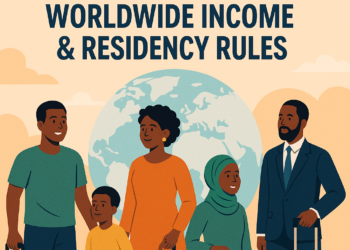In a compelling investigation conducted by Clariform reporters, the desires, and aspirations of young Nigerians in the southeastern region of the country have come to the forefront.
A survey targeting Nigerian youths between the ages of 16 and 30, all born or residing in the southeast, unveiled a resounding sentiment: a staggering 95% expressed a strong inclination to relocate to other regions within Nigeria if given the opportunity.
Amongst this category of people who expressed desire to relocate, about 90% were very clear that they will embrace any opportunity to relocate abroad and away from Nigeria completely.
Their reasons largely revolve around the dearth of opportunities and the perceived absence of federal government presence in all the five states in the southeast of the country.
The voices of these young Nigerians paint a vivid picture of their yearning for a brighter future.
Many spoke of the pressing need to escape the stifling constraints they face in the southeast, where they believe their dreams and ambitions are hampered by a lack of opportunities.
Ngozi Chukwuma, a 22-year-old from Enugu, shared her perspective, stating:
- “Life here is challenging, and the opportunities are scarce. I dream of a career in technology, but it feels like an unattainable dream in Enugu. The federal government’s presence is barely felt here, and we are left with limited prospects.”
Chinedu Okonkwo, a 26-year-old from Aba, echoed similar sentiments, saying:
- “Our region is rich in culture and heritage, but it’s disheartening that we don’t see the same level of development and opportunities as other regions. I’ve always aspired to work in finance, but it’s difficult to envision that happening here in Aba.”
The overwhelming consensus among these young Nigerians is that the southeast region, despite its cultural richness and potential, falls short in terms of economic and educational opportunities.
They express a strong desire to relocate within Nigeria, believing that other regions offer more promising prospects for their careers and personal growth.
This investigative report sheds light on a critical issue, highlighting the aspirations and frustrations of young Nigerians in the southeast.
It underscores the urgent need for increased attention and investment in the region to unlock its full potential and offer its youth the opportunities they crave.
The dreams and ambitions of these young Nigerians should serve as a call to action for policymakers to bridge the disparities between regions and ensure that every corner of Nigeria thrives with opportunities and development.
What State and Federal Government can do?
The southeastern region of Nigeria is endowed with significant potentials that, if harnessed and developed, could create a wealth of opportunities for its residents.
Here are some key areas where both state and federal governments can focus their efforts:
- Manufacturing and Industry: The southeast has a long history of entrepreneurship and small-scale manufacturing. The region can be further developed as an industrial hub. Investment in modern manufacturing facilities, access to credit for small and medium-sized enterprises (SMEs), and government incentives can spur industrial growth. The establishment of industrial parks and clusters can attract investors and create jobs.
- Agriculture: The fertile soil and favourable climate in parts of the southeast make it suitable for agriculture. Governments can support farmers with modern farming techniques, access to markets, and infrastructure development. Promoting agricultural processing and value addition can also enhance the sector’s contribution to the economy.
- Education and Innovation: The southeast has a strong educational tradition. The region can become an educational and innovation hub with investments in universities, research institutions, and technology parks. Encouraging entrepreneurship and startups can lead to the development of a knowledge-based economy.
- Infrastructure Development: Improved infrastructure, including roads, railways, and airports, is essential for economic growth. The government can invest in infrastructure projects that connect the southeast to other regions, facilitating the movement of goods and people.
- Tourism: The southeast is rich in cultural heritage, historical sites, and natural attractions. Promoting tourism can create jobs and generate revenue. Investments in tourism infrastructure, preservation of cultural sites, and marketing can boost this sector.
- Renewable Energy: The region can harness its renewable energy potential, including solar and hydropower, to provide a sustainable source of energy. Investment in renewable energy projects can enhance access to electricity and attract industries.
- Trade and Commerce: The southeast has a strong tradition of trade and commerce. Governments can support the development of modern markets, trade routes, and logistics hubs to facilitate regional and international trade. Nigeria is still an import-based economy, which is mostly championed by southeast trader. Yet there is no single port in the region.
- Healthcare Services: Investments in healthcare infrastructure, medical facilities, and training of healthcare professionals can improve access to quality healthcare services. The region can become a medical tourism destination.
- Skills Development: Skills development programs, vocational training centres, and apprenticeship schemes can equip the youth with marketable skills, reducing unemployment and underemployment. This can as well be replicated across the country, creating opportunities for the Nigerian youths generally.
- Security and Peace: Ensuring security and peace is fundamental for economic development. Government efforts to maintain law and order can create a conducive environment for investment and growth. The rising insecurity in the region must be arrested and federal government has a lot to do to achieve this. First should be the release of Mazi Nnamdi Kanu from detention.
Harnessing these potentials requires a coordinated effort between state and federal governments, as well as active involvement from the private sector and civil society.
It’s essential to create an enabling environment for businesses to thrive, ensure inclusivity in economic development, and prioritize sustainable and equitable growth in the southeast region.
———————————————————————————————————
Editorial Note: This report will cover all the regions in Nigeria. The rest are in the works and will soon be released as soon as they are ready.
For any enquiries please, email our editorial team at [email protected]. If you liked this story, kindly sign up for Clariform Newsletter, a handpicked selection of stories that helps you clarify things that matter and gives you clear signals about your world, delivered directly to your inbox.
Please subscribe to our YouTube channel, and join thousands of Clariform on Facebook, Twitter and Instagram.












